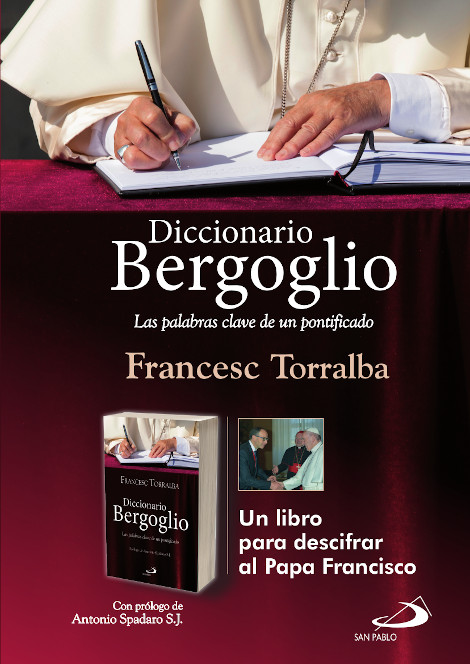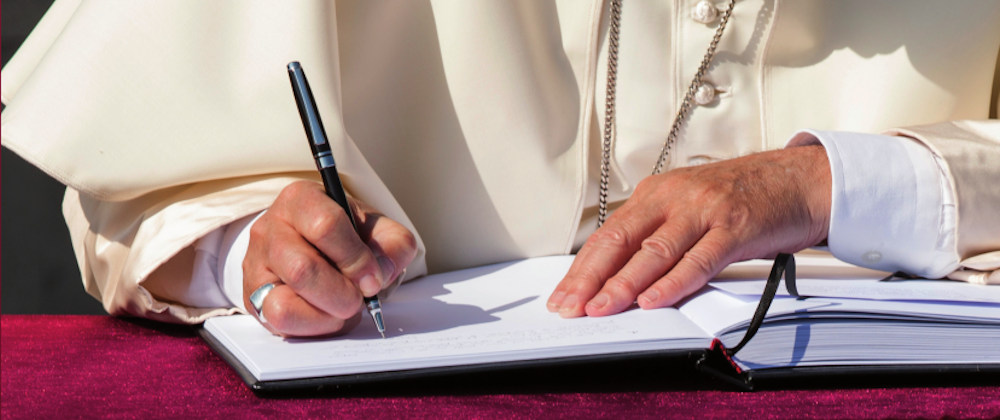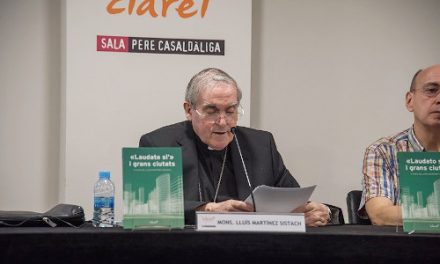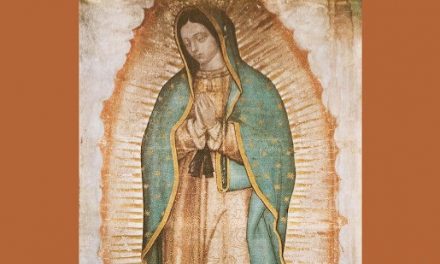Francesc Torralba reveals in a book the keys of Pope Francis’ pontificate
 Francesc Torralba, director of the Chair Ethos of Applied Ethics of the Ramon Llull University and the Chair of Christian Thought of the Bishopric of Urgell and full academician of the Royal European Academy of Doctors-Barcelona 1914 (RAED), has published the book “Diccionario Bergoglio: Las palabras clave de un pontificado” (Bergoglio Dictionary: The key words of a pontificate), where he reveals the keys of the pontificate of Pope Francis. “When reading Francesc Torralba’s dictionary I have experienced a feeling of gratitude because the present volume helps us to perceive the specific weight of the word and the expressions of Pope Francis. In it the language of Bergoglio is probed and invites us to continue the work”, says Italian priest Antonio Spadaro, director of the Christian thought magazine “La Civiltà Cattolica” (Catholic Civilization) in the prologue.
Francesc Torralba, director of the Chair Ethos of Applied Ethics of the Ramon Llull University and the Chair of Christian Thought of the Bishopric of Urgell and full academician of the Royal European Academy of Doctors-Barcelona 1914 (RAED), has published the book “Diccionario Bergoglio: Las palabras clave de un pontificado” (Bergoglio Dictionary: The key words of a pontificate), where he reveals the keys of the pontificate of Pope Francis. “When reading Francesc Torralba’s dictionary I have experienced a feeling of gratitude because the present volume helps us to perceive the specific weight of the word and the expressions of Pope Francis. In it the language of Bergoglio is probed and invites us to continue the work”, says Italian priest Antonio Spadaro, director of the Christian thought magazine “La Civiltà Cattolica” (Catholic Civilization) in the prologue.
The concepts “spiritual Alzheimer’s”, “ecological conversion”, “culture of discarding”, “martialism”, “mercy”, “psychology of the grave” or “revolution of tenderness” are some of the voices of this “Bergoglio Dictionary”, which gathers the concepts that support the framework of one of the most exciting papadas in the history of the Church. A pontificate full of symbolic images and peculiar gestures of Pope Francis. Torralba recovers the ideas and principles of a pontificate who transcends the apparent and shows his thoughts, in which the neighbor is always present.
Torralba explains that he was interested in the figure of Bergoglio before being Pope and that when he was archbishop of Buenos Aires he already studied his expressions and key words of his sermons and pastoral publications. “The texts included in the work aren’t ordered by chronological order or by teaching, but by simple alphabetical order to make reading easy and try to explain these key expressions.
 They all have a double reading, one of a universal level of understanding and another already with a deep meaning that is linked to the Bible, the New Testament and theological texts”, Torralba explained in an interview to the program “La Linterna de la Iglesia” (The Church Lantern) of the radio network Cope on October 25.
They all have a double reading, one of a universal level of understanding and another already with a deep meaning that is linked to the Bible, the New Testament and theological texts”, Torralba explained in an interview to the program “La Linterna de la Iglesia” (The Church Lantern) of the radio network Cope on October 25.
For the academician, the intention of the Pope is none other than to convey his message and that of the Gospel to all corners and cultures, with a language full of metaphors and common images. Many of these expressions appear in the renowned encyclical “Laudatio sí”, where the Pope addresses the necessary relationship of respect for man with the Earth. “The Pope is able to break the inbred circles and even in the texts handle a very verbal and acceptable language. It’s something that marks this pontificate: escape from tradition and inbreeding”, concludes the author.





